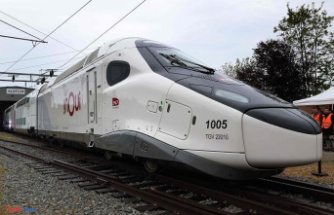A report to the Kremlin paints a bleak picture of the economy's future. Dependence on Western technology, a lack of income and a brain drain are likely to cause gross domestic product to plummet. The question is how deep it will be.
Russia may be facing a severe recession and major economic difficulties due to the sanctions imposed by the West. This is reported by the financial news agency "Bloomberg" and refers to an internal report for the Russian government. The document is the result of months of work by government officials and outside experts, it said. It paints a much bleaker picture than official assessments of the impact of the sanctions.
The Russian central bank assumes that the gross domestic product will shrink between four and six percent this year. Economic output will also fall in 2023, albeit less sharply.
Two of the three scenarios assume that Russia's gross domestic product will not return to the level it was before the start of the aggressive war in Ukraine until the end of the decade. The most optimistic scenario predicts that next year's economic output will be 8.3 percent below 2021 levels. The most pessimistic assumes a minus of 11.9 percent.
According to the document, Russia is primarily affected by import and export restrictions. But that's not all: the authors estimate that around 200,000 IT specialists will have left the country by 2025.
A large part of the export sector will be affected by the sanctions, "Bloomberg" quotes from the report. The oil, gas, chemical and timber industries are affected. A complete halt to gas supplies to Europe would result in the equivalent of $6.6 billion in lost tax revenue each year. Even in the medium term, these shortfalls cannot be offset by new sales markets. The metal industry loses 5.7 billion dollars annually.
Should the global economy slip into recession, Russia is likely to be hit particularly hard, according to the report. Because buyers would initially do without Russian products. This could lead to a weaker ruble and thus higher inflation.
According to the report, when it comes to imports, Russia is mainly hit by the fact that spare parts for Western machines can no longer be obtained. If these are not repaired, this will slow down economic growth in the long term. "There is simply no substitute for critical imports," quotes "Bloomberg" from the report. The lack of Western technology will throw the economy back one to two generations, it is said. Alternatives from China or Southeast Asia, for example, are much less advanced.
A few examples: Only 30 percent of machine tools are made in Russia, according to the report. Almost all poultry production and much of the dairy industry is dependent on seeds from the West, from which animal feed is bred. Almost all aircraft come from abroad - a lack of spare parts could ensure that a large part of the fleet has to remain on the ground. And restrictions on the export of SIM cards could mean that they will become scarce by 2025 at the latest.












